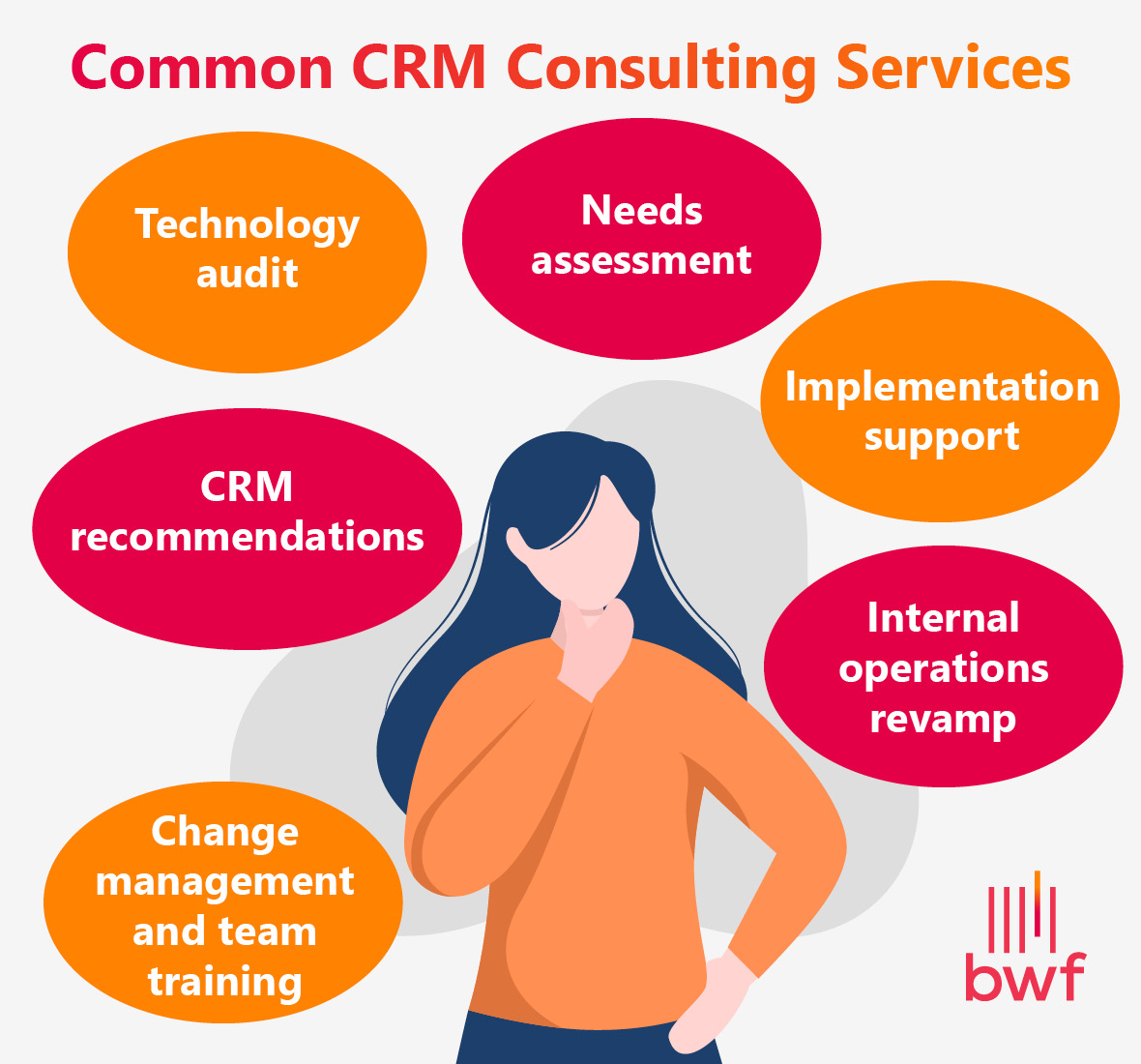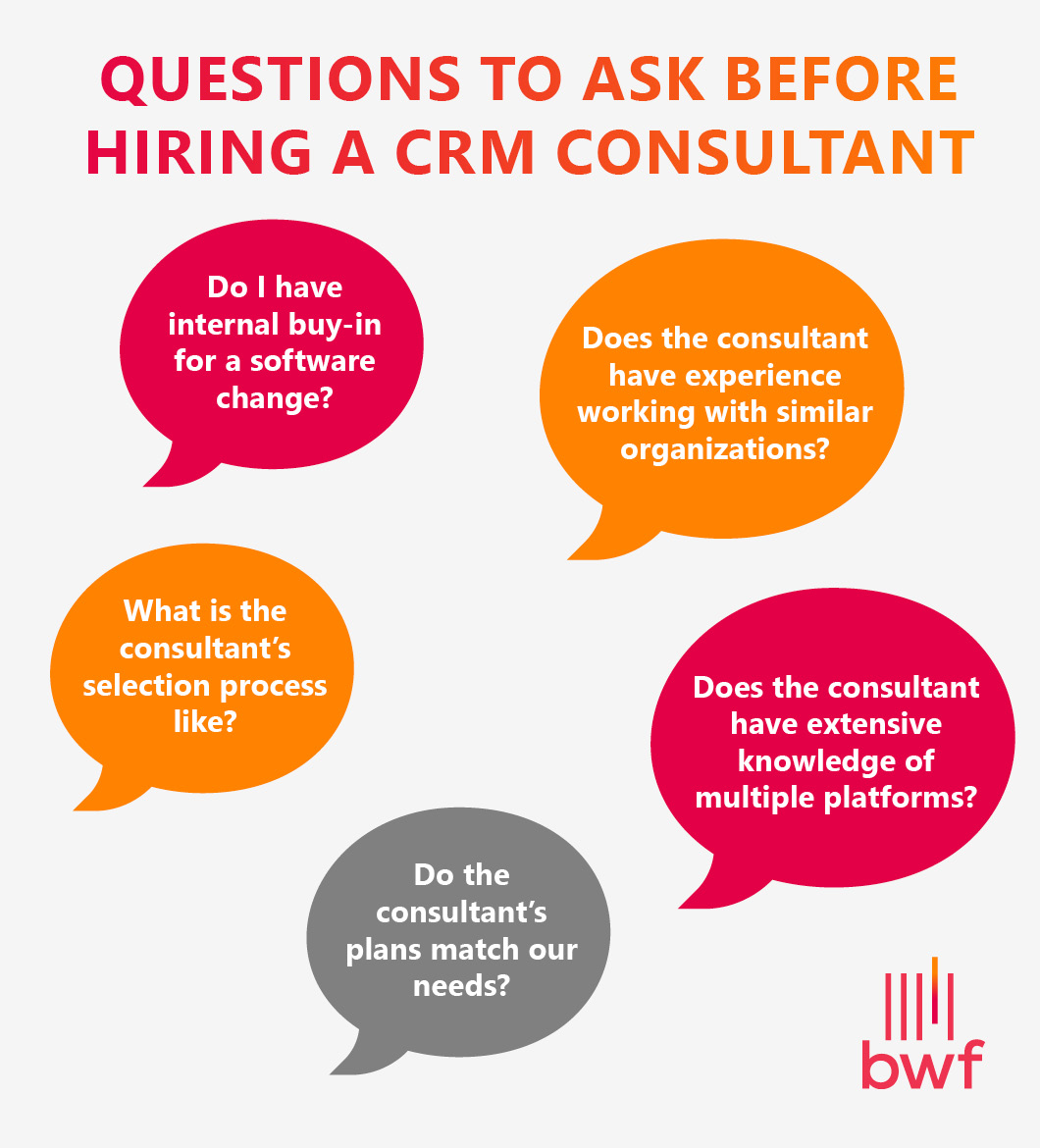CRM software is an essential tool that helps nonprofits maintain organized constituent records, track their fundraising and donor engagement processes, and manage donor outreach. When it comes to choosing your nonprofit’s first CRM system or deciding whether to switch to a new platform, the process isn’t as clear-cut as it might seem.
The global nonprofit CRM market is already massive, and it’s projected to reach $927.3 million by 2028. Search the term “nonprofit CRMs” on Google, and dozens of options come up, each with its own unique features. Parsing through the benefits and drawbacks of each option can be a time-consuming process, especially for busy nonprofit professionals with many tasks on their plates already.
That’s where nonprofit CRM consulting comes in. CRM consultants can work with your nonprofit, assessing your unique needs and goals to find the right solutions and achieve CRM implementation success.
In this guide, we’ll cover everything you need to know about CRM consulting:
- CRM Consulting FAQs
- Common CRM Consulting Services
- Questions to Ask Before Hiring a CRM Consultant
- Best Practices for Working with a CRM Consultant
- Our CRM Consultant Recommendation: BWF
Let’s get started by reviewing some commonly asked questions about CRM consulting.

CRM Consulting FAQs
What is CRM consulting?
A CRM (constituent or customer relationship management system) is a platform that allows organizations to maintain records for constituents in their community. These solutions are essential for all organizations, from small community nonprofits to global charitable organizations.
CRM consulting is a service offered by many nonprofit consulting firms to help organizations determine whether they need to switch to a new CRM system, choose the best platform, and help manage the transition. CRM consultants have experience working with various solutions and can assess your nonprofit’s needs to find the right choice that will fit your criteria.
What do you need to become a CRM consultant?
CRM consultants are experienced professionals that work with a variety of nonprofits, universities, museums, hospitals, and other organizations to help optimize their technology platforms. They typically have a degree or strong background in information technology or computer science, as well as a history of working at or with nonprofits.
What are the benefits of hiring a CRM consultant?
Hiring a CRM consultant will be a separate investment from the cost of your new CRM system. Since you’re already having to pay to get up and running with your new platform, you might be wondering if entering into multi-vendor partnerships is the right move.
CRM consultants offer plenty of benefits that will allow your organization to achieve a higher return on investment (ROI) from your new software, making these partnerships well worth the extra costs. Hiring a CRM consultant is a worthwhile investment for your nonprofit because:
- They offer an objective third-party view.
- They have the expertise needed to manage a significant technology transition, ensuring that your data is kept secure in the process.
- They can help review your internal processes alongside your technology upgrade to ensure your organization is functioning efficiently.
- They can provide counsel and guidance when it comes to change management and strategy.
- They can ensure that your daily operations aren’t negatively impacted by the technology change.
- They can customize your CRM configuration to meet your organization’s unique needs.
- They have a finger on the pulse of current trends and can implement best practices to help your organization see a higher ROI from the transition.
One of the most valuable benefits of hiring a CRM consultant is their experience. Your nonprofit might not have any staff members who have participated in or managed a CRM transition. Partnering with someone who knows the ropes and can manage the process efficiently can help your organization avoid major roadblocks and headaches.
Common CRM Consulting Services
Every CRM consultant will offer a unique approach, but there are some essential services you should expect from your consultant. When searching for the right CRM consulting partner, prioritize organizations that offer the following services:

- Technology audit. Your CRM consultant should assess your nonprofit’s current technology solutions to determine the pros and cons of your existing system. They can take note of your favorite features of your current platform and identify areas where your solutions are falling short.
- Needs assessment. Your CRM consultant will connect with relevant stakeholders, including the staff members who will use your CRM platform daily. They will collect information on your current procedures, fundraising and donor engagement goals, and relevant pain points of your current system. Then, they will work with you to create a list of must-have and nice-to-have features and assess your budget to find solutions in your price range.
- CRM recommendations. The consultant will present a range of recommendations based on your needs and budget. It’s helpful to look for a consultant who is impartial or platform-agnostic, so they won’t push you toward choosing one CRM over another.
- Implementation support. After you’ve chosen your new CRM platform, your consultant will support you throughout the implementation process. This involves mapping your data from your old system to your new one to ensure nothing is lost in the transition. Your consultant will also configure your new system based on your nonprofit’s needs and activate integrations as needed.
- Internal operations revamp. Your CRM consultant will also take this opportunity to determine if your internal systems and processes require an update. For example, they might recommend new strategies for uploading or updating donor information or integrating an email platform within your CRM system.
- Change management and team training. It can be challenging to get team members on board with a new system if they’re used to doing things a certain way. Your CRM consultant can help manage this transitional period among your staff members, taking the time to train your team so everyone is on the same page about your new system.
At the end of the consulting process, your consultant should leave you with a successful CRM implementation and the tools and training needed to maintain your data processes over time.
Questions to Ask Before Hiring a CRM Consultant
Perhaps after starting the consultant research process, you narrow your list of options to a few top options. To help choose the right firm for your nonprofit, ask yourself the following questions:

Do I have internal buy-in for a software change?
Have you made a compelling case to your team for why this software change is essential? Are your staff, board members, and other key stakeholders on board with the investment? Strong team-wide support is essential to help make the final decisions needed to bring a consultant on board.
Does the consultant have experience working with similar organizations?
Ask your top consultants for examples or testimonials from past nonprofits they’ve worked with that are similar to yours and that offer compelling insights into what your partnership could look like.
Does the consultant have a comprehensive knowledge base that spans multiple platforms?
Your consultant should be well-versed in a variety of CRM options to present your organization with a truly comprehensive view of the available solutions.
What is the consultant’s selection process like?
Are they platform agnostic, or do they work with one specific solution? A platform-agnostic approach helps ensure that you’ll find the right solution for your specific needs and not be influenced into adopting a system that may not be the right fit.
Do the consultant’s plans match our needs?
To help make your decision, you can send your top candidates a request for proposal (RFP). In your RFP, you’ll lay out your organization’s software requirements and goals. In response, each candidate will outline their initial recommendations and a plan of action.
If you decide to submit RFPs, carefully review each proposal to see which one best aligns with your nonprofit’s values and vision for the future state of your technology.
Best Practices for Working with a CRM Consultant
After selecting your CRM consulting partner, you’ll want to take several steps to ensure that your nonprofit receives the highest ROI possible from the partnership. These steps include:
- Establish clear goals for the partnership. You and your consultant should be on the same page about the goals of the consulting relationship, the timeline for the CRM implementation and training process, and how you’ll establish reporting processes to track your progress. Set clear goals at the start of the consulting process to minimize misunderstandings.
- Maintain open communication. Clearly communicate your nonprofit’s expectations and goals throughout every phase of the consulting process. Create guidelines for ongoing communication, such as a regularly-scheduled check-in meeting or a twice-weekly email update.
- Set guidelines for a long-term relationship. Establish agreed-upon guidelines for a productive ongoing partnership that lasts after the initial CRM implementation. For example, determine how long the partnership will continue and what kinds of ongoing services you should expect from the consultant.
Your consultant is there to provide their expertise and background knowledge, so be sure to listen to their recommendations. However, don’t be afraid to speak up if you need clarification on the consultant’s approach or want to propose adjustments to the process. Your relationship with your consultant should be a collaborative one built on mutual respect and a desire to see your nonprofit succeed.
Our CRM Consultant Recommendation: BWF
As mentioned, when searching for a CRM consultant, it’s important to prioritize experience and depth of knowledge. BWF stands out as a top option for nonprofits, universities, and healthcare organizations looking for a consulting firm with relevant expertise and depth of knowledge.
BWF is a trusted consulting firm with over forty years of experience helping organizations manage CRM transitions. Our CRM consulting services include:
- Establishing a timeline and auditing your current technology
- Defining your needs
- Helping you select the right CRM software for your organization
- Supporting your team during the implementation, including strategic planning and change management
- Post-implementation support, including system configuration, reporting strategy, continued change management support, and re-imagining of business processes
We offer expertise in a wide range of CRM platforms, including:
- Blackbaud CRM
- Blackbaud Raiser’s Edge NXT
- Salesforce
- Microsoft Dynamics
- Abila Millennium
- Ellucian Advance
- Ellucian CRM
- Ellucian Banner
- Slate
BWF takes a fully platform-agnostic approach that helps your nonprofit find the best system for long-term fundraising success.
CRM Consulting Nonprofit Case Study: National FFA Foundation

The National FFA Foundation needed a more modern CRM platform with comprehensive features. The organization selected StratusLive as its CRM solution and partnered with BWF to help maintain continuity throughout the implementation process.
As a result, the organization has experienced a major fundraising boost, including an increase in their pledge fulfillment rate and average gift amount.
Find out more about our nonprofit CRM consulting services
CRM Consulting University Case Study: Cleveland State University

Cleveland State University came to BWF with a problem: they were using an outdated technology stack that no longer served their needs. The university was looking to upgrade its CRM platform with a modern fundraising solution that would consolidate disparate and aging tech systems and set the university up for greater success in future major fundraising campaigns.
BWF led the university through the CRM selection and implementation process, with Slate’s Technolutions platform chosen as the university’s new system. BWF continued providing the university with ongoing support to ensure a successful transition.
Find out more about our university CRM consulting services
CRM Consulting Healthcare Case Study: Indiana University Health

The Indiana University Health (IU) healthcare system turned to BWF for support in converting from a decentralized operating model to a centralized one by consolidating 12 separate foundations and development offices into a single foundation.
IU took advantage of BWF’s services in framework building, CRM data aggregation, and strategic planning for areas like data governance and long-term database needs. By the end of the project, IU was able to successfully merge multiple databases and establish sustainable fundraising and data management strategies.
Find out more about our healthcare CRM consulting services
Wrapping Up
Your nonprofit CRM is your organization’s most important resource for keeping your fundraising and donor management efforts organized and efficient. Choosing the right platform and implementing it with the help of a CRM consultant is your best chance for achieving sustainable success.
Looking for more information about nonprofit fundraising and data management? Start with these resources:
- AI Fundraising is the Future. Here’s What You Need to Know. AI fundraising tools can take nonprofit data management to the next level. This guide provides an overview of the current state of AI fundraising.
- Fundraising Predictive Analytics: Expert Tips for Nonprofits. Fundraising predictive analytics help your nonprofit anticipate future donor behaviors. Find out how an organized CRM platform can help optimize your predictive modeling efforts.
- Digital Fundraising | 7 Powerful Campaign Ideas to Try. After you’ve chosen and set up your new CRM system, you’ll be ready to tackle a number of new fundraising initiatives, including digital campaigns. Consider these seven campaign ideas for your next online initiative.
Let’s Talk
Find out how BWF can partner with you to guide your organization through the CRM selection and implementation process.





